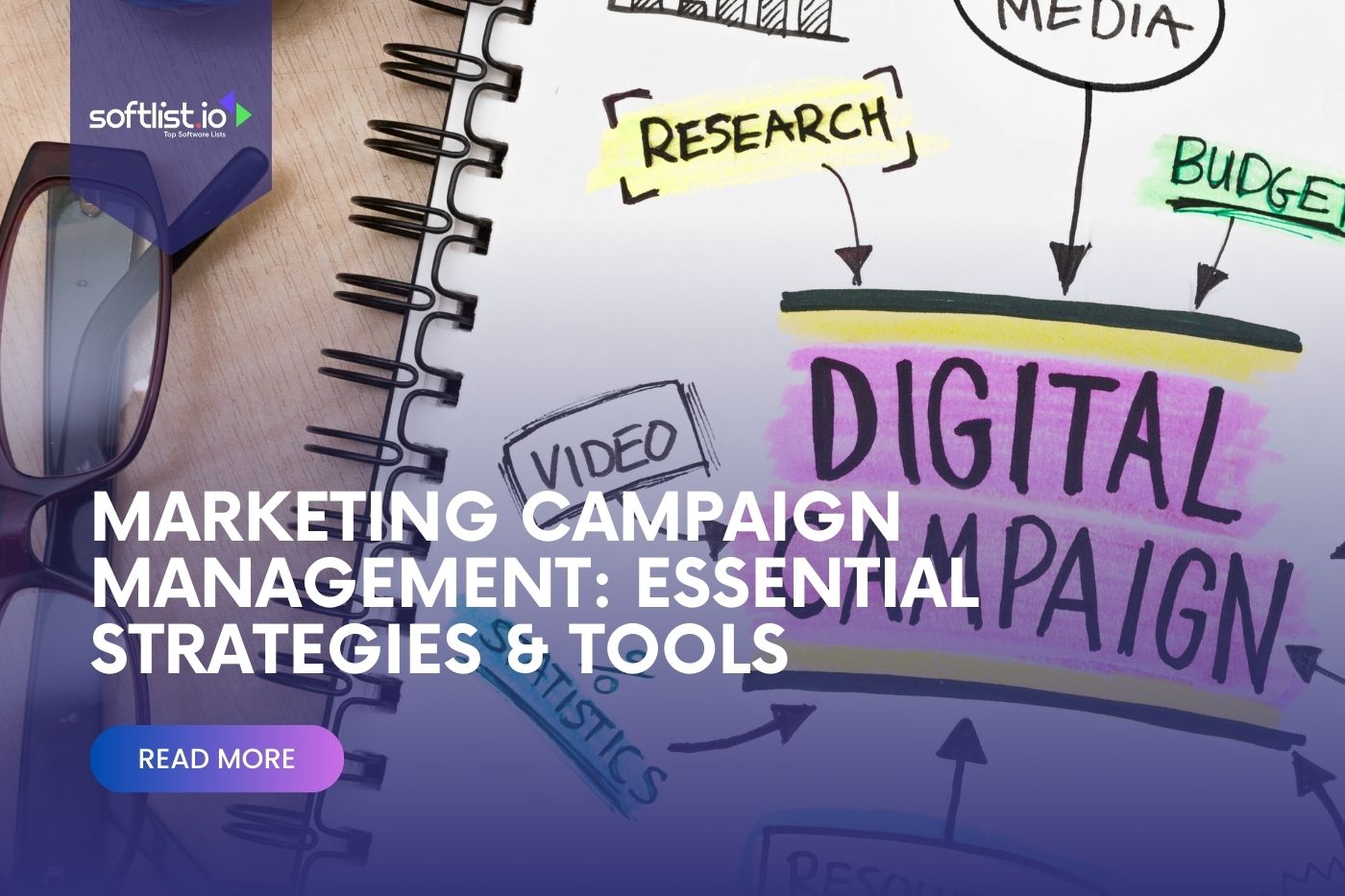Marketing campaign management is a vital skill for success in today’s world of online advertising. Welcome to the exciting and important world of marketing campaign management. This article is your guide, whether you’re starting out or already a pro, to mastering the art of creating compelling campaigns that connect with audiences and drive significant business results.
Here, we explore the key elements, strategies, and tools you need for your marketing efforts, aiming to be insightful for a broad range of readers. An intelligent, well-informed approach to campaign management can open new doors for businesses of every size to flourish and connect in the competitive online market.
The Essentials of Marketing Campaign Management
Source: Canva Pro
Definition and Importance
Marketing campaign management is the orchestration of planning, executing, analyzing, and fine-tuning marketing endeavors to hit precise business objectives. Ensuring all marketing efforts are in sync and efficient across different platforms is crucial, boosting impact and productivity.
In our fast-moving digital world, adept campaign management often separates thriving brands from those that fade into the background. It helps businesses remain relevant, engage deeply with their audience, and drive meaningful conversions, all contributing to overall success.
Components of a Successful Campaign
Let’s break down what makes a marketing campaign effective:
- Objectives: These are specific, quantifiable goals in line with your broader marketing strategy.
- Target Audience: Identifying the specific group of consumers your campaign is designed to attract and engage.
- Channels: Like pay-per-click ads, social media, or email marketing, picking the right channels for your message is important.
- Content: Making content for your social media or email marketing campaign that speaks to your community and fits with your campaign goals.
- Metrics: The numbers that tell you how well your campaign performs, guiding your strategy forward.
Grasping these elements and their interplay is essential for any marketing team or campaign manager. Whether you’re planning a content marketing strategy, leveraging marketing automation tools, or managing a complex project, understanding these basics is key to crafting campaigns that resonate with your audience and yield measurable outcomes.
Planning and Strategy Development
Source: Canva Pro
Setting Clear Objectives
At the heart of any impactful marketing initiative lies the formulation of clear, measurable objectives. Think of these goals as your guiding star, your roadmap to success. They need to be SMART: Specific, Measurable, Achievable, Relevant, and Time-bound. This isn’t just a buzzword; it’s about having a crystal-clear vision for your campaign.
Whether you want to elevate brand visibility, increase product sales, or expand your subscriber list, solid objectives provide a focused path for strategy crafting and ensure your campaign hits the mark.
Audience Identification and Segmentation
Knowing your target well is like having a secret weapon. You need to understand who you’re talking to to create messages that truly connect and spark action. This is where audience segmentation shines. Your marketing will be more targeted and successful if you divide your audience into groups based on things like age, gender, interests, or behaviors.
Dive into market research, scrutinize your customer data, and harness social media analytics to get an in-depth view of your audience’s world. With this information, you can make a program that exactly fits their wants and needs.
Campaign Management Tools and Techniques
Source: Canva Pro
Choosing the Right Channels
Selecting the proper channels for your campaign is a make-or-break decision. Where does your audience hang out? What kind of message are you sending? For a younger crowd, social media marketing campaigns are your go-to. If you’re more into B2B, then email might be your golden ticket. Don’t overlook the power of PPC advertising for instant visibility or SEO for sustained presence. It’s all about matching the strengths of each channel to your campaign’s goals and your audience’s preferences.
Content Creation and Management
Quality content is the pulse of any marketing campaign. It must captivate your audience, clearly convey your message, and inspire the desired response. This calls for a strategy that tunes into your audience’s challenges and interests, crafting stories that connect on a human level.
Managing this content and ensuring it’s released on schedule and across the proper channels requires careful planning. Use content calendars and marketing campaign management software to keep everything organized and timely.
Technology and Tools
In today’s world, technology and the right tools can supercharge your marketing campaign management. From CMS for seamless content handling to CRM systems for customer insights, the digital toolbox is vast.
Tools for social media marketing like Hootsuite or Buffer make it easier to manage multiple channels, and analytics platforms like Google Analytics give you a lot of information about how your efforts are doing. The trick is choosing tools that align with your campaign’s complexity, goals, and budget.
Quickly and easily show which campaigns drive the most leads and conversions with Advanced Analytics. Plus, view your organic, paid, and web metrics in one dashboard.
Monitoring, Analysis, and Optimization
Source: Canva Pro
Key Performance Indicators (KPIs)
Ineffective campaign management, keeping a close eye on Key Performance Indicators (KPIs) is non-negotiable. These vital metrics act as your campaign’s heartbeat, such as Click-Through Rate (CTR), Conversion Rate, and Return on Investment (ROI). They tell you what’s working and what’s not in real-time.
This means you can quickly tweak your strategy for better results. The trick is to have a solid analytics setup from day one, ensuring your data isn’t just numbers but a treasure trove of actionable insights.
Leveraging Data for Optimization
Here’s where the magic happens in marketing campaign management. Using analytics for optimization is all about turning data into action. It’s not enough to just collect numbers; you need to dive into them, understand them, and use them to sharpen your campaign.
Think A/B testing everything – from your email headlines to your website design. By regularly analyzing your campaign’s performance, you’re making minor improvements and continually enhancing its impact and ROI.
Challenges in Marketing Campaign Management and Solutions
Common Pitfalls and How to Avoid Them
Navigating the complexities of marketing campaign management isn’t without its challenges. Standard stumbling blocks include a lack of understanding of your audience, fuzzy objectives, or underestimating the resources needed.
The antidote? Deep dive into market research, set clear and achievable goals from the start, and be realistic about your budget and team capabilities. Being adaptable and ready to shift gears based on data and market trends can save your campaign from pitfalls.
Adapting to Changing Market Trends
The digital marketing world is always on the move, constantly evolving with new technologies and shifting consumer habits. Staying updated with these changes is crucial to keep your campaigns on the front line.
This means regular industry updates, continuous learning for your team, and a willingness to test new waters. Embracing flexibility and staying proactive helps you transform these changes from potential threats into golden opportunities, keeping your campaigns fresh and competitive.
The Future of Marketing Campaign Management
Emerging Trends and Technologies
As we peer into marketing campaign management, it’s clear that the landscape is set for some thrilling changes, with Artificial Intelligence (AI) and Machine Learning (ML) leading the charge.
These technologies promise to revolutionize how we manage marketing campaigns, bringing in predictive analytics and personalized marketing messages that can dramatically lift campaign effectiveness.
Plus, with the advent of voice search and augmented reality (AR), we’re looking at new, creative ways to catch our audience’s attention. Marketers keen on staying ahead must embrace these advancements to streamline operations and open up exciting new channels for audience engagement.
Leveraging Expertise: When to Consider Outsourcing
As your organization grows, you might find that managing your marketing campaigns in-house becomes a tall order. That’s where outsourcing enters the picture. It’s a big decision, no doubt, but it could be a smart move if you’re feeling stretched thin, lack specific expertise, or want to dip your toes into new marketing waters risk-free.
Outsourcing can bring a fresh perspective, cutting-edge tools, and extensive experience to your campaigns, freeing you to focus on other key aspects of your business while still nailing your marketing goals.
Leveraging Expertise: When to Consider Outsourcing
When considering outsourcing your campaign management, there are a few key factors to weigh in:
- Expertise and Resources: Check if the external partner offers specialized know-how and tools your team doesn’t have. This can be a game-changer in areas like PPC, SEO, and data analytics.
- Cost-Effectiveness: Outsourcing can often be more wallet-friendly than internally building the capability from scratch. Factor in the speed and efficiency an expert partner can offer.
- Flexibility and Scalability: Outsourcing allows you to quickly adapt your marketing efforts to meet market changes or seasonal trends without the long-term commitment of expanding your team.
When picking your outsourcing partner, prioritize transparency, a solid track record, and a synergy with your business values and goals. Set up clear lines of communication and keep tabs on the partnership to ensure it keeps aligning with your business’s evolving needs.
Conclusion or Final Thoughts
Mastering marketing campaign management is a turning point in ever-evolving digital marketing. It’s all about crafting strategies that hit the mark, using the right tools, and keeping your pulse on the marketing objectives.
Whether you’re managing campaigns with your in-house team or thinking about outsourcing, the secret sauce is to remain adaptable, well-informed, and laser-focused on your goals. As marketing continues to evolve, those who stay nimble and creative are the ones who will excel in this competitive space.
Broaden your marketing skill set with Softlist. Having learned about marketing campaign management, explore our ‘Social Media Management‘ category for more strategies to maximize your online presence.
FAQs
What is the difference between marketing campaign management and general marketing management?
Think of marketing campaign management as the hands-on process of steering individual campaigns from start to finish, focusing on specifics like project management, campaign planning, and using various marketing channels. In contrast, general marketing management guides the overall marketing direction and strategy, ensuring that every marketing campaign and various marketing activities align with the broader business objectives.
How can I measure the ROI of my marketing campaigns effectively?
To measure ROI, track both the direct costs of your campaign and the revenue it generates. Use analytics tools to attribute sales or conversions directly to the campaign and consider short-term and long-term impacts.
What are some cost-effective tools for small businesses to manage marketing campaigns?
A lot of easy-to-find or cheap tools, like Google Analytics, Hootsuite for managing social media, and Mailchimp for email marketing, have powerful features for tracking and running campaigns.
How often should I review and adjust my marketing campaign strategy?
Regularly review campaign performance against your KPIs—at least monthly. Be prepared to adjust based on performance data and changing market conditions as needed.
Can you recommend strategies for multi-channel marketing campaign management?
For effective multi-channel campaign management, ensure consistent messaging across all platforms, leverage data to understand where your audience is most engaged, and use integrated tools for a cohesive view of campaign performance.







